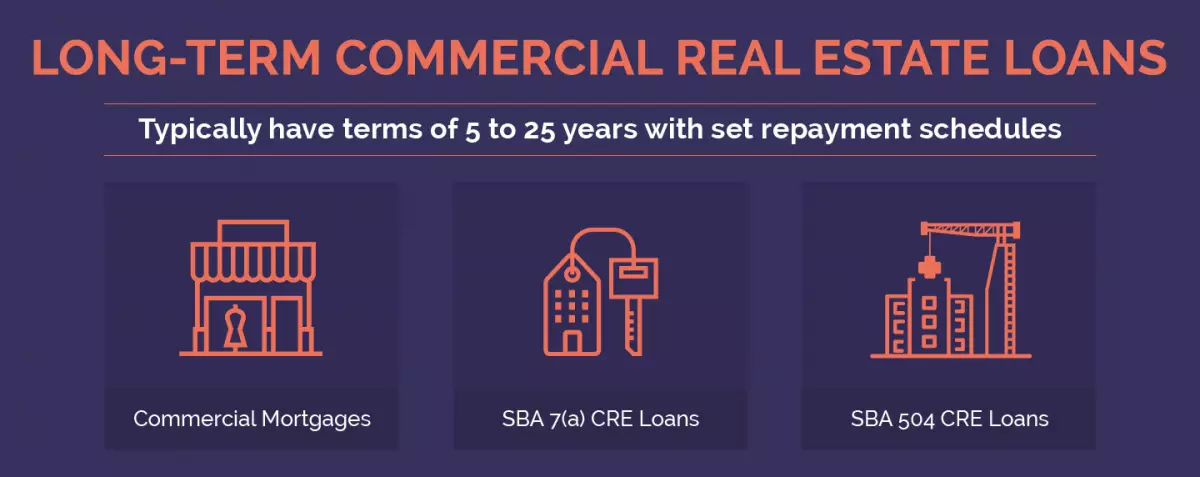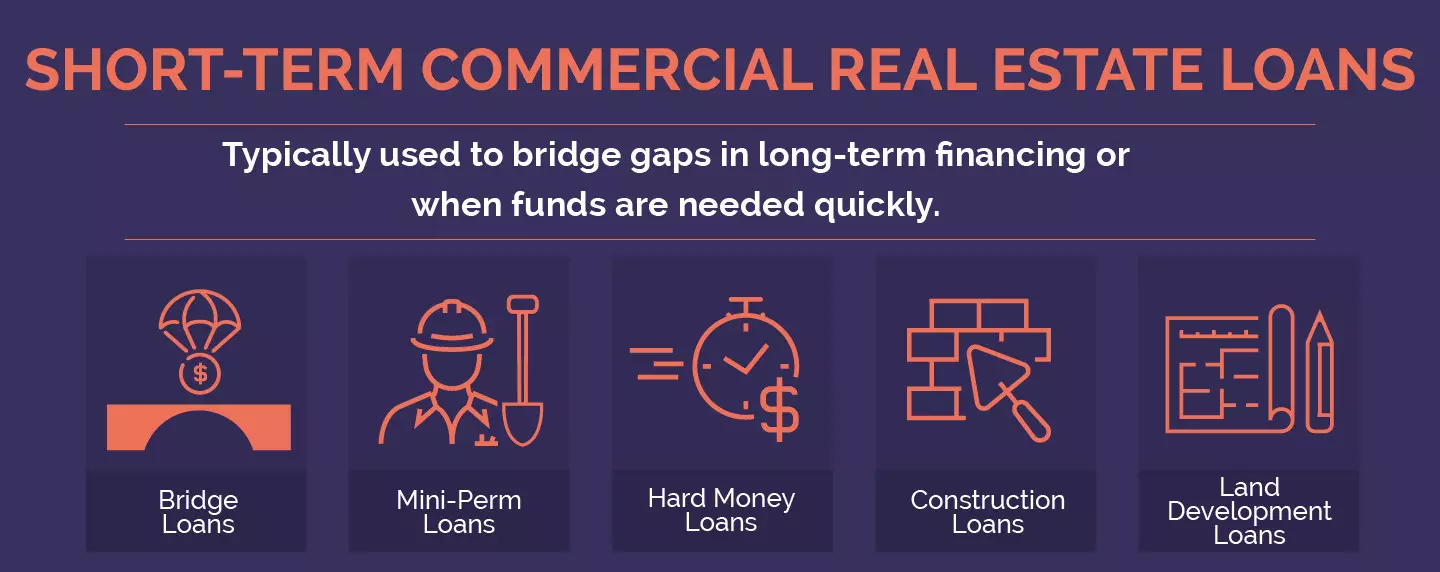Hey there, fellow entrepreneurs! Ever thought about expanding your business by purchasing property or maybe giving your current space a well-deserved makeover?
Commercial real estate loans, often called CRE loans, could be your golden ticket! We’re talking about financing specifically designed to help you buy, renovate, or refinance commercial properties—offices, shops, warehouses, you name it.
This isn't your typical walk in the park, though. These loans come with their own set of rules, different from those home loans we're all familiar with. But don't worry, we'll break it all down together, step by step. We'll explore the different loan types, the pros and cons of each, and even what lenders look at before saying "yes." Think of this as your cheat sheet to confidently securing the best loan for your business dreams. Let's dive in!
Commercial Real Estate Loan Pros & Cons: A Quick Look
Before we get into the nitty-gritty, let's quickly compare some common CRE loan types:
| CRE Loan Type | Pro | Con |
|---|---|---|
| Commercial Mortgage | Longer loan terms and potentially larger loan amounts. | Approval might be tougher for startups or those with lower credit scores. |
| Construction Loan | Flexible short-term and long-term options; may better suit construction project needs and timelines. | Might require a significant down payment. |
| Land Development Loan | May offer higher loan amounts for land development and improvement costs. | Qualifying can be tricky without a solid credit history and a strong business track record. |
| SBA 7(a) Loan | Potentially lower interest rates than other options. | Qualifying can be challenging without good credit or impressive sales figures. |
| SBA 504 Loan | Provides long-term fixed-rate financing, likely with attractive APRs. | Funds have specific, pre-approved uses. |
| Bridge Loan | Faster access to funding compared to long-term loans. | Interest rates can be higher. |
| Mini-Perm Loans | Provides temporary financial support to new businesses building their customer base and credit. | Interest rates might be higher compared to other loan types. |
How Commercial Real Estate Loans Work: The Inside Scoop
Think of commercial real estate loans as the business version of a home mortgage. These loans are designed specifically for businesses looking to buy or revamp property.
Here's the catch: they're not handed out to individuals. You'll need to apply as a formal business entity – this could be anything from an LLC to a corporation.
While there are similarities to residential mortgages, some key differences could trip you up if you're not prepared.
Collateral & Loan Guarantees: What Secures Your Loan?
In most cases, the property itself acts as collateral – a safety net for the lender if you can't repay. This is often called a "non-recourse loan."
However, if your credit score needs a boost, the lender might ask for a loan guarantee. This means finding a third party with good credit to vouch for you – someone willing to step in if your business defaults on the loan. It's an extra layer of security for the lender.
Eligibility Requirements: Clearing the Hurdles
Let's be real, getting a CRE loan isn't a cakewalk. Lenders see them as riskier than your typical home loan, so they'll scrutinize your application with a fine-tooth comb. Here's a sneak peek at what they're looking for:
- Occupancy: Your business needs to be the primary occupant of the property, using at least 51% of the space.
- Credit Score: A minimum FICO Small Business Scoring Service (SBSS) score of 140 is often the starting point.
- DSCR (Debt Service Coverage Ratio): Think of this as your business's ability to handle the loan payments. A DSCR of 1 or higher, ideally between 1.25 and 1.5, is what most lenders look for.
- Personal Credit History: A clean track record with no major blemishes like defaults or foreclosures is crucial.
- Property Type: It has to be zoned for commercial use – we're talking shops, offices, warehouses, not family homes.
Lenders also analyze the loan-to-value (LTV) ratio – the loan amount compared to the property's worth. Expect them to set this between 65% to 80%, meaning you'll need a down payment ready for the remaining 20% to 35%.
Types of Commercial Real Estate Loans: Finding Your Perfect Match
Now for the fun part – picking the right loan! There's a whole menu of CRE loans, each with its own personality in terms of rates, terms, and what they can be used for.
Let's break down the most common types:
Long-Term Commercial Real Estate Loans: Playing the Long Game
These are your traditional, long-haul financing options with terms ranging from 5 to 25 years and fixed repayment schedules, much like a home mortgage. They're a good fit for:
- Construction projects
- Land development
- Property purchases

Let's take a closer look at some popular choices in this category:
Commercial Mortgage: Securing Your Business Home
- What it is: A loan designed for purchasing commercial property for your business – retail space, office, warehouse, you name it! They can also be used for land you plan to develop commercially.
- Why you might choose it: Owning your own space gives you stability and builds equity over time.
- Keep in mind: Lenders are extra cautious with these, given the large sums and longer terms. Expect a more rigorous approval process and stricter eligibility criteria.
SBA 7(a) CRE Loans: A Helping Hand for Small Businesses
- What it is: These loans, offered through regular commercial lenders, come with the backing of the Small Business Administration (SBA). They offer flexibility, meaning you can use the funds for more than just real estate.
- Why you might choose it: They often come with attractive, low, fixed interest rates, making them easier on your budget.
- Keep in mind: They're notoriously tricky to qualify for. Lenders usually require a good personal credit score (think 690 or above), strong business revenue, and at least two years in business. Expect a down payment of 10% or more, depending on the lender.
SBA 504 CRE Loans: Powering Growth & Expansion
- What it is: These loans are tailored for renovating existing commercial property or purchasing equipment to help your business grow. They're partially funded by Certified Development Companies (CDCs) – non-profits focused on boosting local economies.
- Why you might choose it: Aside from the perks of lower interest rates and longer terms, these loans usually require a smaller down payment (around 10%), making them more attainable for smaller businesses.
- Keep in mind: There are restrictions on what you can use the funds for. Working capital, inventory, or debt consolidation are off the table. You'll also need to provide detailed records of how the funds were used.
Short-Term Commercial Real Estate Loans: Quick Solutions for Immediate Needs
Short-term loans can be a lifesaver if you need funding quickly or don't meet the stricter requirements of long-term options. These loans usually have terms from one to five years.

Here's a look at some scenarios where short-term financing might be your best bet:
Bridge Loans: Bridging the Gap in Your Financing
- What it is: Think of this as a short-term fix, with terms typically ranging from 6 months to 3 years. They're handy if you can't secure a long-term loan right away, need to refinance an existing loan, or are waiting for other long-term financing to come through.
- Why you might choose it: Bridge loans can be a lifeline if you need to cover smaller renovation costs without refinancing your entire mortgage or if you don't meet the requirements for a traditional loan. They're also great for bridging the gap while you wait for another loan approval. Plus, they often have a much faster application and approval process.
- Keep in mind: Convenience comes at a price – expect higher interest rates than other loan types. Make sure you can comfortably handle the cost before taking the plunge.
Construction Loans: Building Your Vision
- What it is: These loans are designed specifically for building a new commercial property or giving your existing one a major facelift. You can usually find them at banks, credit unions, and even through private investors as hard money loans.
- Why you might choose it: Many lenders offer tailored construction loans with flexible repayment terms, giving you some breathing room. These loans can cover everything from materials to labor costs.
- Keep in mind: Be prepared to put down a significant down payment, usually between 10% to 30% of the loan amount, as lenders see these as higher risk.
Land Development Loans: Turning Raw Land into Opportunity
- What it is: This is your go-to option for financing the purchase of undeveloped land for your business, whether you plan to build on it later or get it ready for sale.
- Why you might choose it: If you're eyeing a piece of land for future development or want to add essential infrastructure like utilities, this loan can make it happen.
- Keep in mind: Lenders have specific requirements regarding zoning, surveys, and land-use restrictions. Also, undeveloped land might come with higher borrowing costs compared to land that already has some improvements.
Mini-Perm Loans: A Stepping Stone for New Businesses
- What it is: These are short-term loans (typically 3 to 5 years) designed to help you pay for income-producing construction projects, commercial properties, or even investment properties. They're often used as a stop-gap solution until a project is completed and you can qualify for longer-term financing.
- Why you might choose it: Mini-perm loans can be a lifesaver for new businesses or those with limited credit history who don't initially qualify for traditional CRE loans. They provide a way to start building a positive payment history, making it easier to secure larger loans down the line.
- Keep in mind: Since lenders see these as riskier, expect higher interest rates. Also, these loans are based on the assumption that your property or investment will be profitable by the time the loan matures. Unexpected delays or cost overruns could make repayment challenging.
Hard Money Loans: When Speed and Property Value Matter Most
- What it is: These short-term loans focus on the value of your property, not your credit score. Lenders in this space are more interested in the collateral than your financial history.
- Why you might choose it: If you need quick funding, have a less-than-perfect credit history, or don't qualify for other CRE loans, hard money loans offer a solution.
- Keep in mind: These loans often come with higher interest rates due to their riskier nature.
Finding the right commercial real estate loan is crucial for your business growth. Remember to carefully consider your needs, compare different loan options, and don't hesitate to seek advice from financial experts to make the most informed decision.







